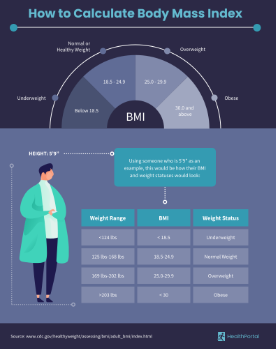In our quest for a healthier lifestyle, it’s crucial to keep track of various health metrics. One such metric that often takes center stage is BMI, or Body Mass Index. While it’s not the sole indicator of health, understanding your BMI can be a valuable tool in your wellness arsenal. In this blog post, we will delve into the significance of BMI in maintaining and improving overall health and wellness.
Understanding BMI
Before we delve into the importance of BMI, let’s first understand what it is. Body Mass Index is a numerical value calculated from your height and weight. It provides an estimate of your body fat and helps categorize individuals into different weight classes. The formula for calculating BMI is simple:
BMI = (Weight in kilograms) / (Height in meters)²
If you prefer to use pounds and inches, the formula changes slightly:
BMI = (Weight in pounds) / (Height in inches)² x 703
Now, let’s explore why knowing your BMI is essential for your overall health and wellness journey.

Identifying Weight-Related Health Risks BMI serves as a quick and easy way to gauge whether you fall into a healthy weight range. By knowing your BMI, you can quickly identify if you are underweight, normal weight, overweight, or obese. Each of these categories has distinct health implications.
People with a BMI in the overweight or obese range are at a higher risk of developing various health issues, including heart disease, type 2 diabetes, high blood pressure, and certain types of cancer. On the other hand, individuals with a BMI below the healthy range may face a higher risk of nutrient deficiencies, weakened immunity, and other health complications.
Monitoring Progress
Whether you’re aiming to lose weight, gain muscle, or simply maintain a healthy weight, tracking your BMI can help you monitor your progress. It provides tangible data that can motivate you to stay committed to your fitness and wellness goals. As you make positive lifestyle changes, you can observe changes in your BMI over time, providing concrete evidence of your efforts paying off.
Tailoring Your Fitness Plan
Your BMI can also guide you in tailoring your fitness and nutrition plans to suit your specific needs. For instance, if your BMI indicates that you are overweight or obese, you may want to focus on calorie management, exercise, and a balanced diet to reduce your BMI and lower your risk of obesity-related health conditions. Conversely, if your BMI is low, you can work on building muscle and ensuring you’re consuming enough nutrients to maintain a healthy weight.
Setting Realistic Goals
Setting realistic health and fitness goals is vital for success. BMI can assist you in establishing achievable objectives. By understanding where you currently stand in terms of your BMI and where you should ideally be for your height, you can set realistic weight loss or gain goals. These goals can be more motivating and sustainable than arbitrary numbers on a scale.
Preventing Weight-Related Health Issues
As mentioned earlier, a high BMI is associated with several health issues. Knowing your BMI can be a proactive step in preventing these problems. If your BMI suggests that you are in an unhealthy weight range, you can take action before more serious health conditions develop. Early intervention can make a significant difference in your long-term health and well-being.
Encouraging Accountability
Sharing your BMI with a healthcare provider or fitness professional can foster accountability. They can help you interpret your BMI and provide guidance on achieving and maintaining a healthy weight. Regular check-ins with a healthcare provider can also detect any underlying health issues that might be affecting your BMI.
Now that we’ve established the importance of BMI, let’s delve into how to calculate it. Here’s a step-by-step guide:
Measure Your Weight: Use a scale to measure your weight in either kilograms or pounds. Ensure the scale is on a flat, stable surface and stand still while measuring.
Measure Your Height: Use a tape measure or a wall-mounted height measure to accurately determine your height in either meters or inches.
Convert Units if Necessary: If you measured your weight in pounds and height in inches, convert your weight to kilograms by dividing it by 2.205. If you measured your height in inches, convert it to meters by dividing by 39.37.
Square Your Height: Square your height in meters (or the converted height in meters). This means multiplying your height by itself.
Calculate BMI: Divide your weight in kilograms by the squared height in meters. The result is your BMI.
Interpret Your BMI: Once you’ve calculated your BMI, consult a BMI chart or use an online calculator to determine which weight category you fall into.
Conclusion
In the pursuit of a healthier and more fulfilling life, it’s essential to consider multiple aspects of your well-being. BMI is a valuable tool in this endeavor, providing insights into your weight-related health risks, progress, and goal setting. By knowing your BMI and using it as a guide, you can make informed decisions about your fitness and nutrition, ultimately leading to improved overall health and wellness. So, take the time to calculate your BMI today, and embark on your journey towards a healthier, happier you.


